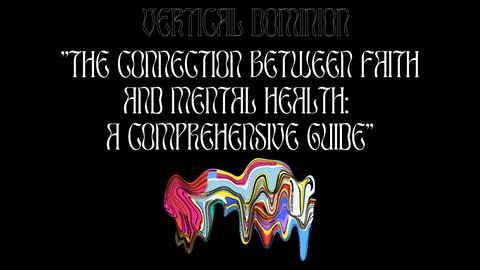The Connection Between Faith and Mental Health: A Comprehensive Guide
Introduction
In a fast-paced world filled with stress and uncertainty, many individuals turn to their faith for solace and support. For centuries, faith has played a vital role in helping people navigate life's challenges. Beyond providing spiritual guidance, it has been increasingly recognized for its impact on mental health. This article will explore the profound connection between faith and mental well-being, offering a comprehensive guide to this intricate relationship.
1. The Comfort of Belief
One of the foundational elements of faith is the comfort it brings during difficult times. We'll delve into how belief systems offer a source of hope and reassurance, reducing anxiety and stress.
2. The Power of Prayer and Meditation
Prayer and meditation are common practices across many faiths. We'll discuss the positive effects of these practices on mental health, including increased mindfulness and reduced symptoms of depression.
3. Community and Social Support
Faith communities often provide a strong support network. We'll explore how these connections can foster a sense of belonging and purpose, benefiting mental health.
4. Coping with Grief and Loss
Loss is an inevitable part of life, and faith can be a significant coping mechanism during times of grief. This section will examine how faith helps individuals navigate the complex emotions that accompany loss.
5. Resilience in the Face of Adversity
Faith can empower individuals to face adversity with resilience. We'll investigate how a strong belief system can promote psychological well-being and the ability to bounce back from challenges.

6. Managing Anxiety and Depression
Many people turn to faith to manage conditions like anxiety and depression. We'll explore how faith-based approaches, in combination with professional treatment, can be effective in improving mental health.
7. Finding Balance and Purpose
Faith often encourages individuals to seek a sense of purpose and meaning in life. We'll discuss how this quest for purpose can contribute to a sense of fulfillment and better mental health.
8. The Role of Forgiveness
Forgiveness is a central theme in many faiths. We'll delve into how the act of forgiveness can relieve emotional burdens and contribute to improved mental well-being.
9. Challenges and Doubts
No journey is without its challenges. We'll address how faith can help individuals navigate doubts and uncertainties, offering strategies to strengthen one's faith in the face of skepticism.
10. Seeking Professional Help
While faith can be a valuable source of support, it's essential to acknowledge when professional help is needed. This section will provide guidance on recognizing the need for therapy and counseling.
Conclusion
Faith and mental health share a profound and intricate connection that can have a positive impact on one's overall well-being. By embracing the comfort of belief, harnessing the power of practices like prayer and meditation, and benefiting from the support of faith communities, individuals can experience improved mental health. Moreover, faith can empower people to cope with adversity, find meaning and purpose, and navigate grief and loss. This comprehensive guide has shed light on the multifaceted relationship between faith and mental health, offering valuable insights for those seeking a holistic approach to well-being.